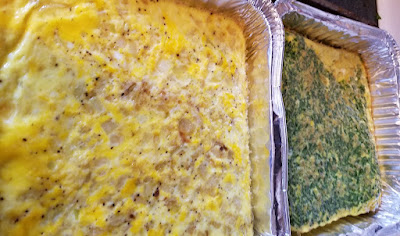It came up in conversation recently that in my area, very few "within period" breakfasts are offered at events. It also came up that we also host very few winter events where outside garb is needed, mostly because we are located in Ohio, and that means snow spits at us and teases us until late January early February, and then it's just ugly. One of these things I can help with, the other, not so much.
In regards to breakfast, there are many, many, many egg dishes found in period that can be used for recreating period breakfasts. Dining in the Middle ages was different then what we associate with breakfast today. According to P. W. Hammond, author of "Food & Feast in Medieval England"
Most commonly only two meals were eaten in a day. Normally the first meal of the day was the major meal. This was dinner. It must originally have been prepared to fit into a late-morning pause after the initial activities of one's daily routine. Because this meal required so much preparation, particularly in affluent households, it could not usually be available much before noon, the sixth hour of the day. By that time half of the day's work - or play - could very well be done. To conclude one's active day a second meal was more easily prepared and served some six or eight hours later, at or just after dusk. Because the original basis for this meal was soup, or sops, it became known as supper. This meal too was subject to elaboration at the hands of professional cooks, but universally it remained a somewhat simpler meal than the midday dinner. According to Platina in the second half of the fifteenth century, at supper 'we must eat food which our stomach can digest easily; however, we must eat rather sparingly, and especially those of melancholy humour whose ills usually are increased by nighttime dampness and food weighing them down with discomfort.
The first dish I chose was Hanoney from HARLEIAN MS. 4016 (ab. 1450 A.D). It is a very simple dish of eggs cooked with butter and onions that have been carmelized.
Hanoney. ¶ Take eyren̄, and drawe the yolkes and white thorgℏ a streynour; And take oynons, And Shrede hem smaƚƚ; And take faire butter or grece, and vnnetℏ ouere-couer the pan̄ therewitℏ; And fry the oynons togidre; then̄ late hem fry to-gidre a lite while; And take hem vppe, And serue hem forthe so, al to-broke yn̄ a dissℏ.
xlix - Hanoney. Take an draw the Whyte and the 3olkys of the Eyroun thorw a straynoure; than take Oynonys, and schrede hem smal; than take fayre Boter or grece, and vnnethe kyuer the panne ther-with, an frye the Oynonys, and than caste the Eyroun in the panne, and breke the Eyrouns and the Oynonys to-gederys; an than lat hem frye to-gederys a litel whyle; than take hem vp, an serue forth alle to-broke to-gederys on a fayre dyssche.
Interpretation (serves 2)
1 small onion chopped
4 eggs
butter for frying
salt and pepper (opt. for modern taste)
Slowly cook onion in butter until translucent. Add beaten eggs and season with salt and pepper. For the event, I coated an aluminum pan with olive oil, placed the onions in the bottom and poured the beaten eggs over the top. I baked it in the oven at 350 for 20 minutes.
If using a pan, I imagine this would be similar to an omelette (for a lovely presentation), or a dish of scrambled eggs with onion in haste and need ;-)
The second recipe I chose to do was inspired by Volker Bach's translation from the original German. This dish is equally simple, eggs flavored with parsley, salt and pepper.
34 A dish of a cake
If you would make a good May cake for a lordly dish, take up ten eggs and beat them well and add parsley to it and stir it together. Set a mortar on the coals, put in a spoonful of fat and let it get hot. Pour in the eggs and let then cook at a low temperature (kwl packen). And serve it whole in a serving bowl. - Heidelberg Cod Pal Germ 551
18 A dish of infidel cake (heidenyschen kuchen)
Item if you would make an infidel cake for a lordly dish, take ten eggs and beat them well and take parsley with it and stir it in. Set a mortar on the coals, put in a spoonful of fat and let it get hot. Pour in the eggs and let it fry at a low temperature (kull pachen). Serve it whole on a serving dish. - Heidelberg Cod Pal Germ 551
Interpretation (serves 2)
2 eggs
Butter or oil
Parsley, Salt and Pepper to taste
See above for instructions
Both of these dishes would make excellent appetizers or camp breakfast dishes. If you are feeling particularly cheeky, they could be made with powdered egg, powdered butter and seasonings to take with you on a hike. I hope you enjoy.


